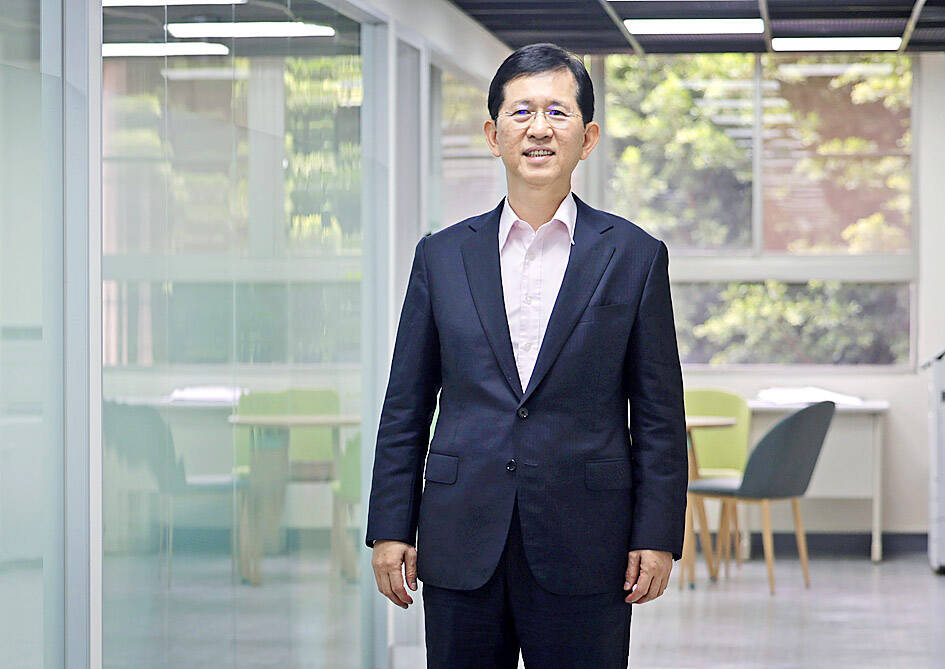Minister of Digital Affairs Huang Yen-nun (黃彥男) yesterday presented his plan to increase the value of Taiwan’s digital market economy to more than NT$1 trillion (US$30.98 billion) within two years.
The Ministry of Digital Affairs’ role is to encourage profit, and as such, its policies should be geared toward assisting with industrial growth, Huang said in an interview with the Chinese-language Central News Agency.
With a global focus on the digital economy, Taiwan should play to its strengths, which would be industries related to artificial intelligence (AI), he said, adding that they remain his priority.

Photo: CNA
Huang said he has three main policies, the first of which is fostering AI “eco-parks” as government measures to develop a digital economy.
He has discussed with National Development Council Director-General Paul Liu (劉鏡清) what incentives would attract foreign and local AI companies to invest in such parks, Huang said.
While the policy is still under discussion, the goal is to have one eco-park in the south and one in the north of the nation, he said, adding that the ministry considers this a vital policy point and hopes to complete all planning by the end of the year.
The ministry is encouraging the Taiwanese information security industry to seek opportunities abroad, Huang said.
Taiwan’s strengths lie in combining software and hardware in one cohesive product, for example, possibly by integrating information security with the Internet of Things, which would help create a digitally secure cloud service that users feel more secure using, he said.
“Software is everything in the future,” Huang said, adding that Taiwan would acquire significant business if it could create packaged solutions applicable to the agricultural, medical and manufacturing sectors.
The second policy is to prevent scamming by having the ministry create a Web site that identifies whether a number belongs to scammers, he said.
The third is to build up information security resilience, Huang said.
He has been sent proposals to amend the Cybersecurity Management Act (資通安全法), which would empower the ministry’s Administration for Cyber Security to inspect the level of information security at government offices, Huang said.
Backing up information to the cloud should be encouraged, and encryption technology, including quantum encoding, should be further researched and utilized, Huang said.
The ministry hopes to popularize the concept of “zero trust” and the use of multifactor authentication technologies, which would significantly deter hackers from accessing internal networks even if a password is leaked, he said.
Asked about the US demanding that ByteDance Ltd (字節跳動) divest TikTok’s US assets or face a ban, Huang said that Taiwan would not take the lead on implementing similar policies, but would continue to monitor developments.
However, he said he “hoped it would come to fruition,” as Taiwan could link to TikTok’s US servers.

A magnitude 7.0 earthquake struck off Yilan at 11:05pm yesterday, the Central Weather Administration (CWA) said. The epicenter was located at sea, about 32.3km east of Yilan County Hall, at a depth of 72.8km, CWA data showed There were no immediate reports of damage. The intensity of the quake, which gauges the actual effect of a seismic event, measured 4 in Yilan County area on Taiwan’s seven-tier intensity scale, the data showed. It measured 4 in other parts of eastern, northern and central Taiwan as well as Tainan, and 3 in Kaohsiung and Pingtung County, and 2 in Lienchiang and Penghu counties and 1

A car bomb killed a senior Russian general in southern Moscow yesterday morning, the latest high-profile army figure to be blown up in a blast that came just hours after Russian and Ukrainian delegates held separate talks in Miami on a plan to end the war. Kyiv has not commented on the incident, but Russian investigators said they were probing whether the blast was “linked” to “Ukrainian special forces.” The attack was similar to other assassinations of generals and pro-war figures that have either been claimed, or are widely believed to have been orchestrated, by Ukraine. Russian Lieutenant General Fanil Sarvarov, 56, head

FOREIGN INTERFERENCE: Beijing would likely intensify public opinion warfare in next year’s local elections to prevent Lai from getting re-elected, the ‘Yomiuri Shimbun’ said Internal documents from a Chinese artificial intelligence (AI) company indicated that China has been using the technology to intervene in foreign elections, including propaganda targeting Taiwan’s local elections next year and presidential elections in 2028, a Japanese newspaper reported yesterday. The Institute of National Security of Vanderbilt University obtained nearly 400 pages of documents from GoLaxy, a company with ties to the Chinese government, and found evidence that it had apparently deployed sophisticated, AI-driven propaganda campaigns in Hong Kong and Taiwan to shape public opinion, the Yomiuri Shimbun reported. GoLaxy provides insights, situation analysis and public opinion-shaping technology by conducting network surveillance

‘POLITICAL GAME’: DPP lawmakers said the motion would not meet the legislative threshold needed, and accused the KMT and the TPP of trivializing the Constitution The Legislative Yuan yesterday approved a motion to initiate impeachment proceedings against President William Lai (賴清德), saying he had undermined Taiwan’s constitutional order and democracy. The motion was approved 61-50 by lawmakers from the main opposition Chinese Nationalist Party (KMT) and the smaller Taiwan People’s Party (TPP), who together hold a legislative majority. Under the motion, a roll call vote for impeachment would be held on May 19 next year, after various hearings are held and Lai is given the chance to defend himself. The move came after Lai on Monday last week did not promulgate an amendment passed by the legislature that